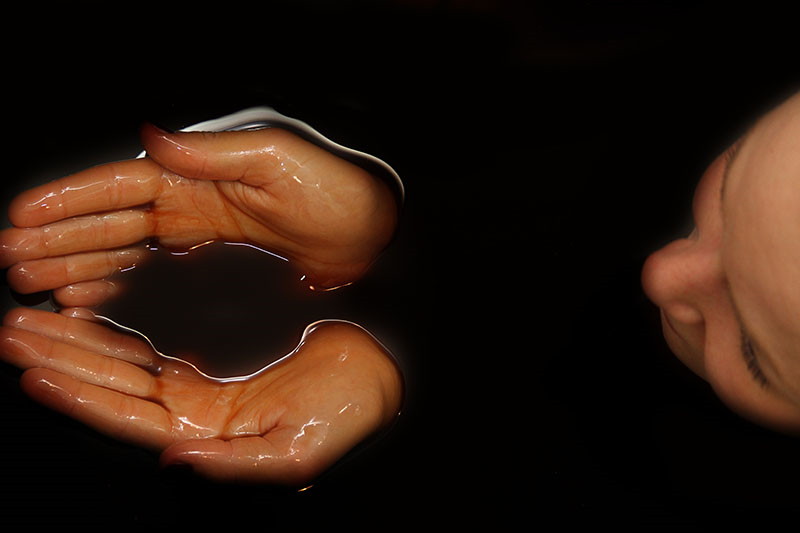Since 1970s, health tourism has been closely associated with the small city of Naftalan in central Azerbaijan. Petroleum spas located there that use a unique grade of oil extracted nearby once lured Soviets, making it a popular vacation spot. Now these little-known places for spa-goers, health aficionados and skincare experts are making a comeback in a country so awash in oil that people are literally swimming in it.
Located at the foothills of the Lesser Caucasus Mountains, the city boasts about its unique grade of black-brown, thick oil, found there and known for its high content of naphthalene – an aromatic, white crystalline carbon compound best known as the main ingredient of mothballs, but said to have uses in alternative medicine and reported to heal over 70 illnesses or ailments.
People have come to sit in Naftalan’s baths of oil for curing common ailments, like rheumatism, arthritis and psoriasis. The oil is said to possess analgesic, anti-inflammatory, vasodilator and anti-allergic effects; activates the intensity of metabolic processes, stimulates the spermatogenesis, and accelerates processes of ovulation and oogenesis.
Those who believe in the powers of the oil can bathe once a day in the local crude that has a 50 percent naphthalene content, which is said to relieve joint pain, cure psoriasis, calm nerves and beautify the skin. Coal tar soaps, used by dermatologists to treat psoriasis, contain naphthalene in a lower concentration.
Located 337 km (210 miles) west of Azerbaijan’s capital city Baku and 50 km (31 mi) southeast of the ancient city of Ganja, Naftalan receives around 60,000 to 100,000 tourists each year, the majority of them being locals.
According to reports, in 2017, the city’s resorts, recreational and health centers received 7,309 foreign tourists from 62 countries, representing a 2,266 person increase from 2016, and the second biggest tourist destination in Azerbaijan after Baku. Most visitors are from Russia, Kazakhstan, Uzbekistan, Turkey and Ukraine.
For the first time in 2017, Naftalan's resorts and recreational centers welcomed tourists from outside the region, including Japan, South Korea, China, India, Cambodia, New Zealand, the Philippines, and countries throughout Latin America.
Ulfat Aliyev, the head of Naftalan Executive Power Information Support and Analysis Sector, said that all the hotels, resorts and health centers of Naftalan were filled in 2017.
"There are even some tourists coming to Naftalan every year. It is difficult to find a tourist who once came to Naftalan and did not want to get treatment here again. There are foreign tourists who are family members, close relatives or friends of people who have been treated in Naftalan and who have completely recovered their health through the miraculous oil bath,” Aliyev said, according to reporting by Azertag.
Naftalan is second to Baku for the number of four and five stars hotels in Azerbaijan, and the attention the city has garnered from the highest levels of Azerbaijan’s central government speaks to the city’s importance.
At the opening of a new hotel and spa in the city in 2011, President Ilham Aliyev said, “We must make sure that the entire tourism infrastructure in Azerbaijan is like this: great level, excellent service, high quality.”
Currently two new hotels and a recreation center are wrapping up construction and will soon be launched. With a population of about 10,000, one out of every four residents in the city is engaged in the health tourism sector.
The first mention of Naftalan’s oil was found in the works by the famous Azerbaijani poet and thinker Nizami Ganjavi (1141-1209 AD), in which he wrote about how the oil was exported via caravans leaving from the village of Safi-Kurd, located near the present city of Naftalan.







 Russian Foreign Minister Sergei Lavrov has reasserted that Moscow has no intentions to stop the fighting in Ukraine, even if peace talks commence.
Russian Foreign Minister Sergei Lavrov has reasserted that Moscow has no intentions to stop the fighting in Ukraine, even if peace talks commence.
 Iran has refuted reports of alleged damage to Shimon Peres Negev Nuclear Research Centre located southeast of Dimona, Israel, during the recent air...
Iran has refuted reports of alleged damage to Shimon Peres Negev Nuclear Research Centre located southeast of Dimona, Israel, during the recent air...
 Iran and Pakistan have signed eight cooperation documents in various fields, and agreed to strengthen ties to fight terrorism in the region.
Iran and Pakistan have signed eight cooperation documents in various fields, and agreed to strengthen ties to fight terrorism in the region.



